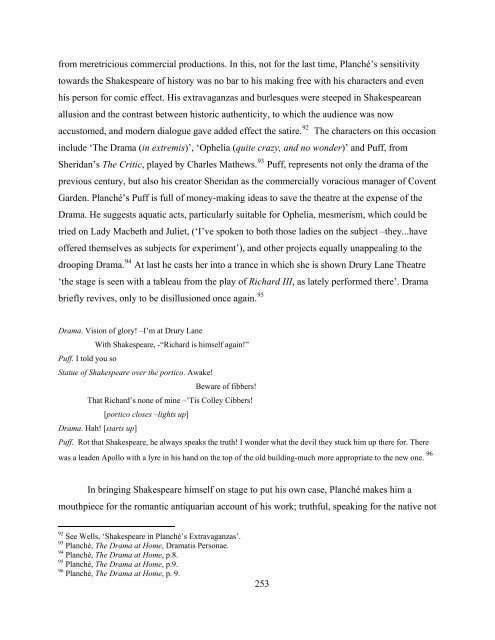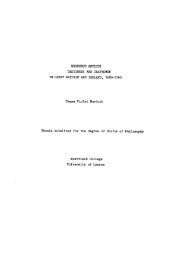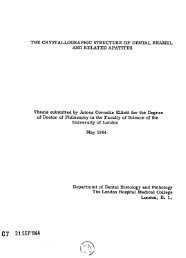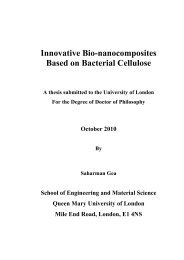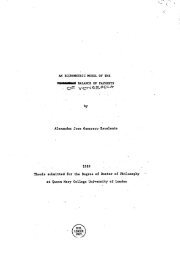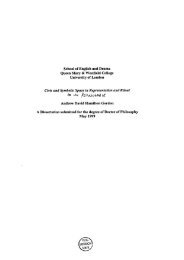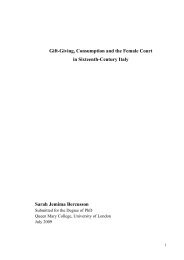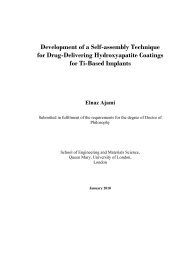Antiquaries in the Age of Romanticism: 1789-1851 - Queen Mary ...
Antiquaries in the Age of Romanticism: 1789-1851 - Queen Mary ...
Antiquaries in the Age of Romanticism: 1789-1851 - Queen Mary ...
You also want an ePaper? Increase the reach of your titles
YUMPU automatically turns print PDFs into web optimized ePapers that Google loves.
from meretricious commercial productions. In this, not for <strong>the</strong> last time, Planché’s sensitivity<br />
towards <strong>the</strong> Shakespeare <strong>of</strong> history was no bar to his mak<strong>in</strong>g free with his characters and even<br />
his person for comic effect. His extravaganzas and burlesques were steeped <strong>in</strong> Shakespearean<br />
allusion and <strong>the</strong> contrast between historic au<strong>the</strong>nticity, to which <strong>the</strong> audience was now<br />
accustomed, and modern dialogue gave added effect <strong>the</strong> satire. 92 The characters on this occasion<br />
<strong>in</strong>clude ‘The Drama (<strong>in</strong> extremis)’, ‘Ophelia (quite crazy, and no wonder)’ and Puff, from<br />
Sheridan’s The Critic, played by Charles Ma<strong>the</strong>ws. 93 Puff, represents not only <strong>the</strong> drama <strong>of</strong> <strong>the</strong><br />
previous century, but also his creator Sheridan as <strong>the</strong> commercially voracious manager <strong>of</strong> Covent<br />
Garden. Planché’s Puff is full <strong>of</strong> money-mak<strong>in</strong>g ideas to save <strong>the</strong> <strong>the</strong>atre at <strong>the</strong> expense <strong>of</strong> <strong>the</strong><br />
Drama. He suggests aquatic acts, particularly suitable for Ophelia, mesmerism, which could be<br />
tried on Lady Macbeth and Juliet, (‘I’ve spoken to both those ladies on <strong>the</strong> subject –<strong>the</strong>y...have<br />
<strong>of</strong>fered <strong>the</strong>mselves as subjects for experiment’), and o<strong>the</strong>r projects equally unappeal<strong>in</strong>g to <strong>the</strong><br />
droop<strong>in</strong>g Drama. 94 At last he casts her <strong>in</strong>to a trance <strong>in</strong> which she is shown Drury Lane Theatre<br />
‘<strong>the</strong> stage is seen with a tableau from <strong>the</strong> play <strong>of</strong> Richard III, as lately performed <strong>the</strong>re’. Drama<br />
briefly revives, only to be disillusioned once aga<strong>in</strong>. 95<br />
Drama. Vision <strong>of</strong> glory! –I’m at Drury Lane<br />
With Shakespeare, -“Richard is himself aga<strong>in</strong>!”<br />
Puff. I told you so<br />
Statue <strong>of</strong> Shakespeare over <strong>the</strong> portico. Awake!<br />
Beware <strong>of</strong> fibbers!<br />
That Richard’s none <strong>of</strong> m<strong>in</strong>e –’Tis Colley Cibbers!<br />
[portico closes –lights up]<br />
Drama. Hah! [starts up]<br />
Puff. Rot that Shakespeare, he always speaks <strong>the</strong> truth! I wonder what <strong>the</strong> devil <strong>the</strong>y stuck him up <strong>the</strong>re for. There<br />
was a leaden Apollo with a lyre <strong>in</strong> his hand on <strong>the</strong> top <strong>of</strong> <strong>the</strong> old build<strong>in</strong>g-much more appropriate to <strong>the</strong> new one. 96<br />
In br<strong>in</strong>g<strong>in</strong>g Shakespeare himself on stage to put his own case, Planché makes him a<br />
mouthpiece for <strong>the</strong> romantic antiquarian account <strong>of</strong> his work; truthful, speak<strong>in</strong>g for <strong>the</strong> native not<br />
92 See Wells, ‘Shakespeare <strong>in</strong> Planché’s Extravaganzas’.<br />
93 Planché, The Drama at Home, Dramatis Personae.<br />
94 Planché, The Drama at Home, p.8.<br />
95 Planché, The Drama at Home, p.9.<br />
96 Planché, The Drama at Home, p. 9.<br />
253


